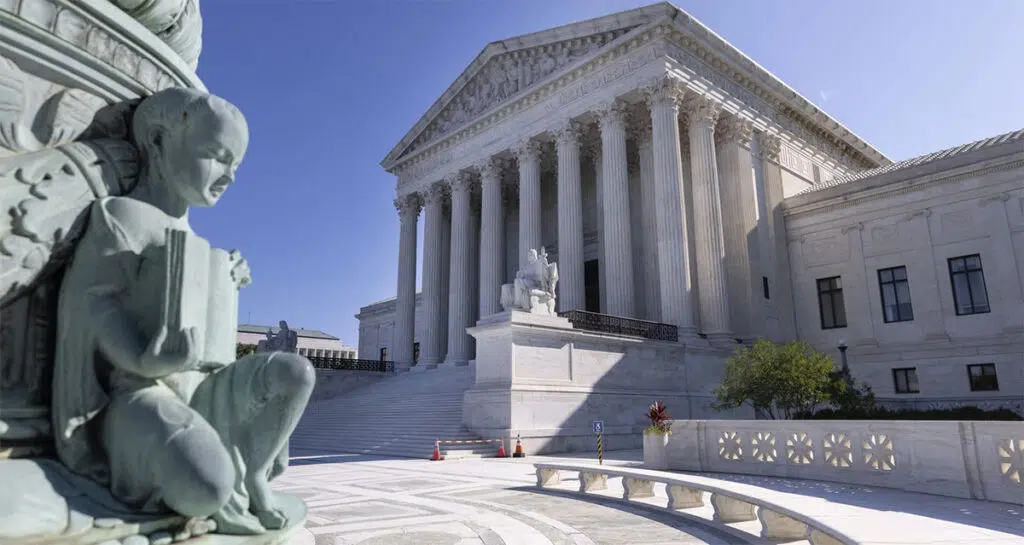
Supreme Court questions how immunity would shape presidency in Trump case
U.S. Supreme Court Justices on Thursday grappled with multiple questions about what a president can and can’t do as they heard oral arguments in a case that could have wide-reaching political ramifications not only for the 2024 election, but well beyond.
Supreme Court justices are considering a case involving former President Donald Trump and if presidents have immunity from criminal prosecutions. Trump’s attorney D. John Sauer said the president must have immunity for a functioning democracy to flourish.
“Without presidential immunity from criminal prosecution, there can be no presidency as we know it,” Sauer told the justices. “For 234 years of American history, no president was ever prosecuted for his official acts.
“If a president can be charged, put on trial and imprisoned for his most controversial decisions as soon as he leaves office, that looming threat will distort the president’s decision making precisely when bold and fearless action is most needed.”
Trump is the first former president to be criminally prosecuted.
During nearly three hours of oral arguments on Thursday, Sauer laid out a frustrating political future in which each successive president could face criminal prosecution after leaving office by a successor from another political party. While some Justices raised questions about the issues that might create, others seemed concerned about another scenario: How would a president operate with the knowledge he or she can’t be prosecuted for official acts while in office? And what distinguishes an official act from an unofficial one?
Michael Dreeben, representing the U.S. Department of Justice and special counsel Jack Smith, said no blanket criminal immunity exists for a president or other public official.
“This court has never recognized absolute criminal immunity for any public official,” he said. “Petitioner, however, claims that a former president has permanent criminal immunity for his official acts unless he was first impeached and convicted. His novel theory would immunize former presidents for criminal liability for bribery, treason, sedition, murder and here, conspiring to use fraud to overturn the results of an election and perpetuate himself in power.”
The nine members of the nation’s highest court had plenty of questions for both sides.
Justice Elena Kagan asked Sauer about a series of hypothetical scenarios, such as if a president sold nuclear secrets to a foreign adversary or if the president ordered the military to stage a coup. Sauer said if the sale of nuclear secrets was “structured as an official act” the president couldn’t face prosecution unless first impeached by the House and convicted by the Senate. As for a coup, Sauer said that “may well” be an official act.
Other justices also had questions about hypothetical scenarios. Sonia Sotomayor asked if a president would get immunity if he ordered someone to assassinate a political rival. Chief Justice John Roberts asked about a president appointing an ambassador in exchange for a bribe. Sauer said bribery wouldn’t be an official act. Roberts responded: “accepting a bribe isn’t an official act, but appointing an ambassador would be an official act.”
Justice Samuel Alito asked Sauer if such broad immunity was really needed or if some narrower form of immunity could be applied.
The justices also had questions for Dreeben, who said under questioning that some special protections must exist for the president, but he framed them far more narrowly than Sauer.
All the justices seemed to agree that their decision would have long-lasting implications.
“We are writing a rule for the ages,” Justice Neil Gorsuch said.
In Washington, Smith’s team charged Trump with four federal counts related to contesting the 2020 election and the storming of the U.S. Capitol building on Jan. 6, 2021. The charges are conspiracy to obstruct an official proceeding, conspiracy to defraud the United States, obstruction, and conspiracy against the right to vote and to have one’s vote counted, according to the indictment. Trump has pleaded not guilty to all charges.
A federal appeals court in February ruled Trump doesn’t have presidential immunity to protect him from charges of election interference in his Washington D.C. case.
“For the purpose of this criminal case, former President Trump has become citizen Trump, with all of the defenses of any other criminal defendant,” the three-judge panel wrote in a unanimous decision. “But any executive immunity that may have protected him while he served as President no longer protects him against this prosecution.”
Roberts appeared skeptical of the lower court’s decision that no immunity exists.
Two of the lower court judges were appointed by President Joe Biden – J. Michelle Childs and Florence Pan – and one, Karen LeCraft Henderson, by George H.W. Bush.
The Washington D.C. case remains on pause while awaiting a decision from the Supreme Court on Trump’s immunity claims.
Trump has said the criminal and civil cases he faces amount to election interference and were designed by Democrats to keep him out of the White House.


